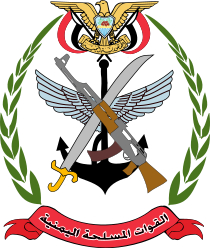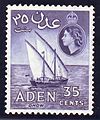Portal:Yemen
Yemen Portal


Yemen, officially the Republic of Yemen, is a country in West Asia. Located in southern Arabia, it borders Saudi Arabia to the north, Oman to the northeast, the Red Sea to the west, and the Indian Ocean to the south, sharing maritime borders with Eritrea, Djibouti and Somalia across the Horn of Africa. Covering roughly 528,000 square kilometres (203,861 square miles), with a coastline of approximately 2,000 kilometres (1,200 miles), Yemen is the second largest country on the Arabian Peninsula. Sanaa is its constitutional capital and largest city. Yemen's estimated population is 34.7 million, mostly Arab Muslims. It is a member of the Arab League, the United Nations, the Non-Aligned Movement and the Organisation of Islamic Cooperation.
Owing to its geographic location, Yemen has been at the crossroads of many civilisations for over 7,000 years. In 1200 BCE, the Sabaeans formed a thriving commercial kingdom that included parts of modern Ethiopia and Eritrea. In 275 CE, it was succeeded by the Himyarite Kingdom, which spanned much of Yemen's present-day territory and was heavily influenced by Judaism. Christianity arrived in the fourth century, followed by the rapid spread of Islam in the seventh century. Yemenite troops played a crucial role in early Islamic conquests. Various dynasties emerged between the 9th and 16th centuries. During the 19th century, the country was divided between the Ottoman and British empires. After World War I, the Kingdom of Yemen was established, which in 1962 became the Yemen Arab Republic (North Yemen) following a coup. In 1967, the British Aden Protectorate became the independent People's Democratic Republic of Yemen (South Yemen), the first and only officially socialist state in the Arab world. In 1990, the two Yemeni states united to form the modern Republic of Yemen, with Ali Abdullah Saleh serving as the first president until his resignation in 2012 in the wake of the Arab Spring.
Since 2011, Yemen has been enduring a political crisis, marked by street protests against poverty, unemployment, corruption, and President Saleh's plan to amend Yemen's constitution and eliminate the presidential term limit. By 2015, the country became engulfed by an ongoing civil war with multiple entities vying for governance, including the Presidential Leadership Council of the internationally recognized government, and the Houthi movement's Supreme Political Council. This conflict, which has escalated to involve various foreign powers, has led to a severe humanitarian crisis. (Full article...)
Selected article -
The Yemeni Armed Forces (Arabic: الْقُوَّاتُ الْمُسَلَّحَةُ الْيَّمَّنِيَّة, romanized: Al-Quwwat Al-Musallahah Al-Yamaniyah) are the military forces of the Republic of Yemen. They include the Yemeni Army (including the Republican Guard), Yemeni Navy (including the Marines) and the Yemeni Air Force (including the Air Defense Force). Since the start of the current civil war in 2014, the armed forces have been divided; at first between loyalists of the former president Ali Abdullah Saleh and pro-Yemeni government forces of president Abdrabbuh Mansour Hadi; as of 2024, between the internationally recognized Presidential Leadership Council (PLC), and the Houthi-led Supreme Political Council (SPC). Per the constitution, the President of Yemen serves as the commander-in-chief. Currently, the presidency and supreme command of the armed forces is disputed between Rashad al-Alimi, Chairman of the PLC, and Mahdi al-Mashat, chairman of the SPC. Before the civil war, the united military was headquartered in the country's capital, Sana’a.
Already before 2014, the number of military personnel in Yemen was relatively high; in sum, Yemen had the second largest military force on the Arabian Peninsula after Saudi Arabia. In 2012, total active troops were estimated as follows: army, 66,700; navy, 7,000; and air force, 5,000. In September 2007, the government announced the reinstatement of compulsory military service. Yemen's defense budget, which in 2006 represented approximately 40 percent of the total government budget, is expected to remain high for the near term, as the military draft takes effect and internal security threats continue to escalate. (Full article...)
List of selected articles
|
|---|
Selected biography -
Abdullah al-Baradouni (Arabic: عبدالله البردوني; 1929–1999) was a Yemeni writer, poet and critic. He published 12 poetry books as well as six other books on topics such as politics, folklore, and literature. He is considered Yemen's most famous poet. (Full article...)
List of selected biographies
|
|---|
General images -
Selected city -
Ibb (Arabic: إِبّ, romanized: ʾIbb) is a city in Yemen, the capital of Ibb Governorate, located about 117 km (73 mi) northeast of Mocha and 194 km (121 mi) south of Sana'a. A market town and administrative centre developed during the Ottoman Empire, it is one of the most important medium-sized cities in the country. It is situated on a mountain ridge, surrounded by fertile land. As of 2023, it has an estimated population of 771,500 residents. Other names for Ibb, is "The Land of Green" (Full article...)
Selected picture -
Selected cuisines, dishes and foods -
Fahsa (Arabic: فحسة, romanized: Fahsa) is a Yemeni stew. It is made of lamb cutlets with lamb broth. Spices and hilbah (a dip made with fenugreek) are added after cooking. (Full article...)
List of articles
|
|---|
Related portals
Religions in Yemen
Arab states
Related portals
Categories
Topics
Related portals
Religions in Yemen
Arab states
Related portals
Associated Wikimedia
The following Wikimedia Foundation sister projects provide more on this subject:
-
Commons
Free media repository -
Wikibooks
Free textbooks and manuals -
Wikidata
Free knowledge base -
Wikinews
Free-content news -
Wikiquote
Collection of quotations -
Wikisource
Free-content library -
Wikiversity
Free learning tools -
Wiktionary
Dictionary and thesaurus










































































